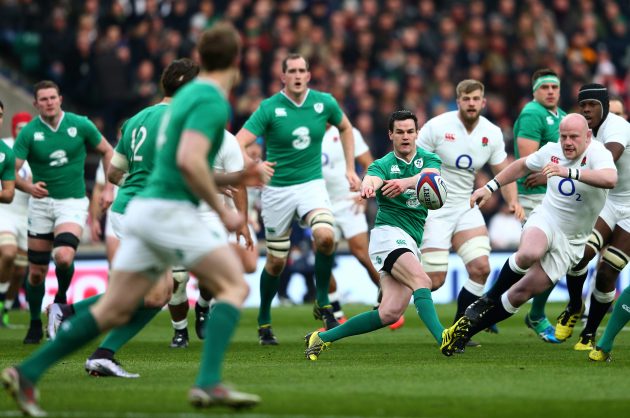There was a shudder in Ireland when it was disclosed that he'd miss the tour to South Africa such is his influence on Joe Schmidt's team, so can they cope without him?
By Alex Shaw
In the 110 years of international rugby that Ireland and South Africa have gone head-to-head, not once have the Irish recorded a victory in South Africa.
That stat alone makes their upcoming three-match tour of the country a foreboding prospect but with talismanic fly-half Jonathan Sexton out of action due to shoulder surgery, the challenge has taken another step towards the improbable.
In Sexton’s stead, Ulsterman Paddy Jackson will (likely) be the man to shoulder the burden of trying to guide Ireland to a debut victory in South Africa and this certainly represents the greatest challenge yet in Jackson’s stop-start Ireland career. With just five starts and 13 caps to his name since he made his test debut three years ago, Jackson is still a rookie at this level and one who has had to play third fiddle to Sexton and Ian Madigan over that period.

Next cab off the rank: Paddy Jackson is expected to start at No 10 in the First Test
However, Jackson is a proven performer in the Guinness Pro12 and European arenas, oft proving the driving force behind Ulster’s accomplishments at both levels. Few would doubt his potential to step up and prove a more than handy test player, but South Africa is a (re)baptism of fire for a man being given the reins, in earnest, for the first time since the 2013 Six Nations.
Sexton is intrinsically linked to the way Joe Schmidt likes the Ireland team operate. Schmidt’s clamour for perfection in every facet prevents Ireland from playing a looser game and though they are not discouraged from playing heads-up rugby and reacting to what is in front of them, there are some fairly rigid guidelines to the way in which the Irish are asked to play.
The Leinsterman is well-suited to this style. His tactical kicking from hand is extremely well-measured and his proficiency at involving himself multiple times in the same phase, via both loops and switches in play, help make up for the fact that Ireland are relatively direct and conservative in their attacking approach. In fact, bringing up the topic of offloads in an Irish bar has been known to cause glazed expressions and wistful sighs amongst nostalgic patrons.

Opportunity knocks: Craig Gilroy’s fine form for Ulster has seen him called-up
The question is, will Jackson be parachuted into Sexton’s role and asked to replicate it or will he be given more of a licence to play in a fashion which he has become accustomed to at Ulster?
With fellow Leinster players (and Schmidt favourites) Rob and Dave Kearney and Luke Fitzgerald also withdrawn from the squad, prompting call-ups for Craig Gilroy, Tiernan O’Halloran and Matt Healy, all of whom have excelled in the Pro12 this season, there is scope for Schmidt to move away from his patented style over the coming weeks.
Schmidt’s reluctance to play a more ambitious brand of rugby comes from his belief that it is a style which cannot be mastered with the time that he has available with the Ireland squad. A three-match series against the Springboks is perhaps not the best time to experiment, but with the team spending just shy of a month together in all, it’s an opportunity to build and develop a fresh approach by the time the third test comes around.
In fairness to Schmidt, some of those shackles were beginning to be removed during the Six Nations. With powerful carriers like Ultan Dillane and Jamie Heaslip breaking the gain line, offloads were once more spotted among the men in green jerseys, particularly against both Italy and Scotland once the prospect of Ireland retaining their title was over.

Power packed: Ultan Dillane will give Ireland dynamism in the engine room
If injuries to Rob Kearney and Simon Zebo prompt a move for Jared Payne to his provincial position of full-back, a spot could be opened up in the midfield for Luke Marshall or Stuart Olding. By moving Payne to full-back and partnering Robbie Henshaw with one of Olding or Marshall, Schmidt would create a familiar, Ulster-flavoured safety blanket for his young fly-half.
Another option could be to move Henshaw to full-back and field a complete Ulster midfield, from 10 to 13, or to turn to O’Halloran at 15 (and Healy on the wing), incorporating more of a Connacht influence in the national team. All three options offer Ireland tantalising opportunities to open up their style of play.
With the plethora of injuries that also riddle the Irish pack, using this tour as a development opportunity, rather than another outing for a style which has become, honestly, quite predictable and possible to counter. As with the power game of Wales, Ireland’s approach brought initial success but has since become limited in its potential, due to teams discovering ways of dealing with it.

Versatile: Robbie Henshaw can play in midfield or at full-back
It is easier said than done to propose that a tour be developmental in its objectives, especially when Schmidt’s long-term future is very much in question and Rugby World Cup seeding is at stake. However, if Schmidt is looking to leave a legacy for Ireland’s next coach or push forward the national team’s development ahead of he himself leading them into the 2019 RWC, these matches against the Springboks offer rare opportunity.
While England blood youngsters in Australia and Wales trust the old guard in New Zealand, Ireland could dramatically alter their philosophical approach over the next few weeks in South Africa. Whether Schmidt stays or goes, it’s something that they need to progress with if they want to rise above their status as a competitive Six Nations side and challenge the big boys of world rugby on a consistent basis.





